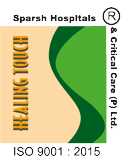Why choose Sparsh Hospitals for Obstetrics and Gynecology?

The Department of Obstetrics and Gynecology at Sparsh Hospitals provides comprehensive care for women’s health, from adolescence through menopause and beyond. Our team of experienced obstetricians, gynecologists, and maternal-fetal medicine specialists are dedicated to delivering personalized care in a compassionate and supportive environment. We offer a full range of services including prenatal care, high-risk pregnancy management, gynecologic surgery, and menopause care, ensuring that every woman receives proper care.
What is Obstetrics and Gynecology?
Obstetrics and Gynecology (OB/GYN) is a medical specialty that focuses on the care of women during pregnancy, childbirth, and the diagnosis and treatment of diseases of the female reproductive system. Obstetricians care for women during pregnancy and childbirth, while gynecologists provide care for all aspects of women’s reproductive health.

Common Conditions and Treatments in Obstetrics and Gynecology
– Pregnancy and Prenatal Care: Comprehensive care during pregnancy including regular check-ups, ultrasounds, and monitoring of maternal and fetal health.
– High-Risk Pregnancy: Specialized care for women with high-risk pregnancies due to factors like diabetes, hypertension, or multiple pregnancies.
– Gynecologic Infections: Treatment of infections such as yeast infections, bacterial vaginosis, and sexually transmitted infections (STIs) with appropriate medication.
– Menstrual Disorders: Management of irregular, painful, or heavy periods with medication, hormonal therapy, or surgical options.
– Menopause: Care for symptoms of menopause including hormone replacement therapy, lifestyle changes, and counseling.
– Gynecologic Surgery: Procedures such as hysterectomy, laparoscopic surgery, and treatment of fibroids, endometriosis, and ovarian cysts.
Diagnostic Tests in Obstetrics and Gynecology
– Ultrasound: Imaging to monitor pregnancy, diagnose gynecologic conditions, and guide certain procedures.
– Pap Smear: Screening test for cervical cancer by collecting cells from the cervix.
– Mammography: Imaging test to screen for breast cancer.
– Blood Tests: To check for conditions like anemia, gestational diabetes, and infections during pregnancy.
– Pelvic Exam: Physical examination to assess the health of the reproductive organs.
Treatments in Obstetrics and Gynecology
– Prenatal Care: Regular monitoring and care to ensure a healthy pregnancy and safe delivery.
– Medication: Antibiotics, hormonal treatments, and pain relief for various gynecologic conditions.
– Surgical Interventions: Minimally invasive and open surgeries for conditions like fibroids, endometriosis, and cancers.
– Hormone Replacement Therapy: Treatment to relieve menopausal symptoms and improve quality of life.
– Fertility Treatments: Options like IVF, IUI, and ovulation induction to assist women in achieving pregnancy.

